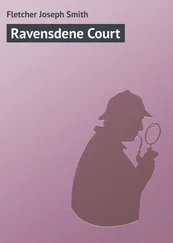Joseph Fletcher - The Rayner-Slade Amalgamation
Здесь есть возможность читать онлайн «Joseph Fletcher - The Rayner-Slade Amalgamation» — ознакомительный отрывок электронной книги совершенно бесплатно, а после прочтения отрывка купить полную версию. В некоторых случаях можно слушать аудио, скачать через торрент в формате fb2 и присутствует краткое содержание. Жанр: foreign_prose, Классический детектив, foreign_detective, foreign_antique, на английском языке. Описание произведения, (предисловие) а так же отзывы посетителей доступны на портале библиотеки ЛибКат.
- Название:The Rayner-Slade Amalgamation
- Автор:
- Жанр:
- Год:неизвестен
- ISBN:нет данных
- Рейтинг книги:3 / 5. Голосов: 1
-
Избранное:Добавить в избранное
- Отзывы:
-
Ваша оценка:
- 60
- 1
- 2
- 3
- 4
- 5
The Rayner-Slade Amalgamation: краткое содержание, описание и аннотация
Предлагаем к чтению аннотацию, описание, краткое содержание или предисловие (зависит от того, что написал сам автор книги «The Rayner-Slade Amalgamation»). Если вы не нашли необходимую информацию о книге — напишите в комментариях, мы постараемся отыскать её.
The Rayner-Slade Amalgamation — читать онлайн ознакомительный отрывок
Ниже представлен текст книги, разбитый по страницам. Система сохранения места последней прочитанной страницы, позволяет с удобством читать онлайн бесплатно книгу «The Rayner-Slade Amalgamation», без необходимости каждый раз заново искать на чём Вы остановились. Поставьте закладку, и сможете в любой момент перейти на страницу, на которой закончили чтение.
Интервал:
Закладка:
The elderly doctor came away from the bed approaching Allerdyke.
"After hearing what Dr. Lydenberg tells me, and examining the body—a mere perfunctory examination as yet, you know—I have little doubt that this gentleman died of what is commonly called heart failure," he said. "There will have to be an inquest, of course, and it may be advisable to make a post-mortem examination. You are a relative?"
"Cousin," replied Allerdyke. He hesitated a moment, and then spoke bluntly. "You don't think it's been a case of poisoning, do you?" he said.
Dr. Orwin pursed his lips and regarded his questioner narrowly.
"Self-administered, do you mean?" he asked.
"Administered any way," answered Allerdyke. "Self or otherwise." He squared his shoulders and spoke determinedly. "I don't understand about this heart-failure notion," he went on. "I never heard him complain of his heart. He was a strong, active man—hearty and full of go. I want to know—everything."
"There should certainly be an autopsy," murmured Dr. Orwin. He turned and looked at his temporary colleague, who nodded as if in assent. Then he turned back to Allerdyke. "If you'll leave us for a while, we will just make a further examination—then we'll speak to you later."
Allerdyke signified his assent with a curt nod of the head. Accompanied by the manager and Gaffney he left the room, and with him he carried the small hand-bag in which he had placed the dead man's personal effects.
CHAPTER III
THE SHOE BUCKLE
Once outside the death-chamber, Allerdyke asked the manager to give him a bedroom with a sitting-room attached to it, and to put Gaffney in another room close by—he should be obliged, he said, to stay at the hotel until the inquest was over and arrangements had been made for his cousin's funeral. The manager at once took him to a suite of three rooms at the end of the corridor which they were then in. Allerdyke took it at once, sent Gaffney down to bring up certain things from the car, and detained the manager for a moment's conversation.
"I suppose you'd a fair lot of people come in last night from that Christiania boat?" he asked.
"Some fifteen or twenty," answered the manager.
"Did you happen to see my cousin in conversation with any of them?" inquired Allerdyke.
The manager shrugged his shoulders. He was not definitely sure about that; he had a notion that he had seen Mr. James Allerdyke talking with some of the Perisco passengers, but the notion was vague.
"You know how it is," he went on. "People come in—they stand about talking in the hall—groups, you know—they go from one to another. I think I saw him talking to that doctor who's in there now with Dr. Orwin—the man with the big beard—and to a lady who came at the same time. There were several ladies in the party—the passengers were all about in the hall, and in the coffee-room, and so on. There are a lot of other people in the house, too, of course."
"It's this way," said Allerdyke. "I'm not at all satisfied about what these doctors say, so far. They may be right, of course—probably are. Still I want to know all I can, and, naturally, I'd like to know who the people were that my cousin was last in company with. You never know what may have happened—there's often something that doesn't show at first."
"There was—nothing missing in his room, I hope?" asked the manager with professional anxiety.
"Nothing that I know of," answered Allerdyke. "My man and I have searched him, and taken possession of everything—all that he had on him is in that bag, and I'm going to examine it now. No—I don't think anything had been taken from him, judging by what I've seen."
"You wouldn't like me to send for the police?" suggested the manager.
"Not at present," replied Allerdyke. "Not, at any rate, until these doctors say something more definite—they'll know more presently, no doubt. Of course, you've a list of all the people who came in last night?"
"They would all register," answered the manager. "But then, you know, sir, many of them will be going this morning—most of them are only breaking their journey. You can look over the register whenever you like."
"Later on," said Allerdyke. "In the meantime, I'll examine these things.
Send me up some coffee as soon as your people are stirring."
He unlocked the hand-bag when the manager had left him. It seemed to his practical and methodical mind that his first duty was to make himself thoroughly acquainted with the various personal effects which he and Gaffney had found on the dead man. Of the valuables he took little notice; it was very evident, in his opinion, that if James Allerdyke's death had been brought about by some sort of foul play—a suspicion which had instantly crossed his mind as soon as he discovered that his cousin was dead—the object of his destroyer had not been robbery. James had always been accustomed to carrying a considerable sum of money on him; Gaffney's search had brought a considerable sum to light. James also wore a very valuable watch and chain and two fine diamond rings; there they all were. Not robbery—no; at least, not robbery of the ordinary sort. But—had there been robbery of another, a bigger, a subtle, and deep-designed sort? James was a man of many affairs and schemes—he might have had valuable securities, papers relating to designs, papers containing secrets of great moment; he was interested, for example, in several patents—he might have had documents pertinent to some affair of such importance that ill-disposed folk, eager to seize them, might have murdered him in order to gain possession of them. There were many possibilities, and there was always—to Allerdyke's mind—the improbability that James had died through sudden illness.
Now that Marshall Allerdyke's mind was clearing, getting free of the first effects of the sudden shock of finding his cousin dead, doubt and uneasiness as to the whole episode were rising strongly within him. He and James had been brought up together; they had never been apart from each other for more than a few months at a time during thirty-five years, and he flattered himself that he knew James as well as any man of James's acquaintance. He could not remember that his cousin had ever made any complaint of illness or indisposition; he had certainly never had any serious sickness in his life. As to heart trouble, Allerdyke knew that a few years previous to his death, James had taken out a life-policy with a first-rate office, and had been passed as a first-class life: he remembered, as he sat there thinking over these things, the self-satisfied grin with which James had come and told him that the examining doctor had declared him to be as sound as a bell. It was true, of course, that disease might have set in after that—still, it was only six weeks since he had seen James and James was then looking in a fit, healthy, hearty state. He had gone off on one of his Russian journeys as full of life and spirits as a man could be—and had not the hotel manager just said that he seemed full of health, full of go, at ten o'clock last night? And yet, within a couple of hours or so—according to what the medical men thought from their hurried examination—this active vigorous man was dead—swiftly and mysteriously dead.
Allerdyke felt—felt intensely—that there was something deeply strange in all this, and yet it was beyond him, with his limited knowledge, to account for James's sudden death, except on the hypothesis suggested by the two doctors. All sorts of vague, half-formed thoughts were in his mind. Was there any person who desired James's death? Had any one tracked him to this place—got rid of him by some subtle means? Had—
"Pshaw!" he muttered, suddenly interrupting his train of thought, and recognizing how shapeless and futile it all was. "It just comes to this—I'm asking myself if the poor lad was murdered! And what have I to go on? Naught—naught at all!"
Читать дальшеИнтервал:
Закладка:
Похожие книги на «The Rayner-Slade Amalgamation»
Представляем Вашему вниманию похожие книги на «The Rayner-Slade Amalgamation» списком для выбора. Мы отобрали схожую по названию и смыслу литературу в надежде предоставить читателям больше вариантов отыскать новые, интересные, ещё непрочитанные произведения.
Обсуждение, отзывы о книге «The Rayner-Slade Amalgamation» и просто собственные мнения читателей. Оставьте ваши комментарии, напишите, что Вы думаете о произведении, его смысле или главных героях. Укажите что конкретно понравилось, а что нет, и почему Вы так считаете.












